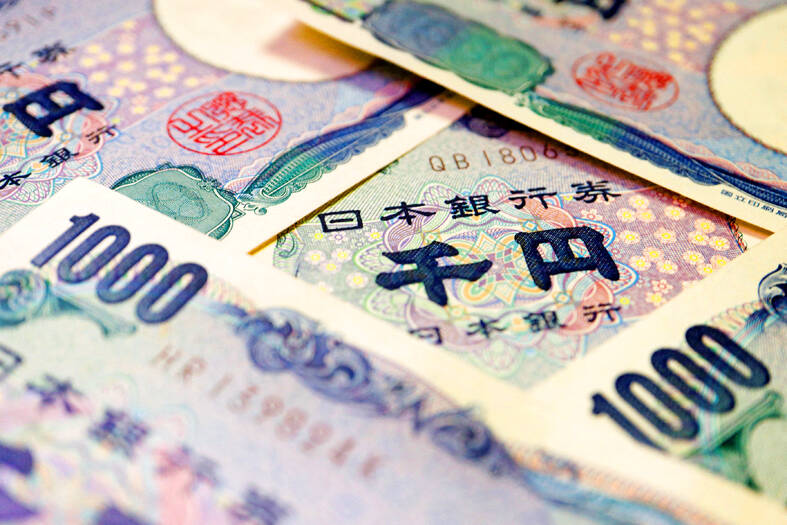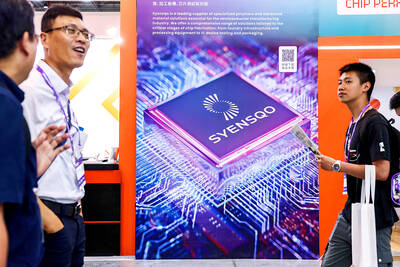Japan intends to closely monitor the impact on its currency of US President Donald Trump’s new tariffs and is worried about the international fallout from the trade imposts, Japanese Minister of Finance Katsunobu Kato said.
“We need to carefully see how the exchange rate and other factors will be affected and what form US monetary policy will take in the future,” Kato said yesterday in an interview with Fuji Television.
Japan is very concerned about how the tariffs might impact the global economy, he added.

Photo: REUTERS
Kato spoke as nations and firms brace for potential repercussions after Trump unleashed the first salvo of his tariff war, with general levies of 25 percent on Canada and Mexico, and 10 percent on China. Trump signed the orders for the tariffs, which are to take effect tomorrow, although it is unclear whether the period in between provides a last-chance window for a deal.
Japanese Prime Minister Shigeru Ishiba is reportedly set to meet Trump on Friday in the US. Tokyo is trying to strengthen ties with the new US administration and Kato recently held a virtual meeting with US Secretary of the Treasury Scott Bessent.
Asked if he had any indications from his US counterpart on whether Trump intends to weaken the US dollar and strengthen the yen, given the president sees the strong greenback as problematic, Kato said the two did not discuss the matter specifically.
“We confirmed that we will closely discuss foreign exchange as we look at the financial and economic conditions as a whole,” he said. “I got the impression that he is a very calm person.”
The yen’s weakness has pushed up the prices of imported food, energy and materials, which has stoked inflation. Persistent price pressures have prompted the Bank of Japan to raise interest rates gradually, while voter discontent over a cost-of-living crunch played a role in delivering a major setback for the nation’s ruling coalition in last year’s election.
Japan intervened in the foreign exchange market multiple times last year to prop up the yen.
“When import prices rise, we will see cost-push inflation,” Kato said. “On the other hand, prices also increase when domestic demand expands. So, there are several phases and I think it is important to carefully assess each situation and take the necessary measures.”

SEMICONDUCTOR SERVICES: A company executive said that Taiwanese firms must think about how to participate in global supply chains and lift their competitiveness Taiwan Semiconductor Manufacturing Co (TSMC, 台積電) yesterday said it expects to launch its first multifunctional service center in Pingtung County in the middle of 2027, in a bid to foster a resilient high-tech facility construction ecosystem. TSMC broached the idea of creating a center two or three years ago when it started building new manufacturing capacity in the US and Japan, the company said. The center, dubbed an “ecosystem park,” would assist local manufacturing facility construction partners to upgrade their capabilities and secure more deals from other global chipmakers such as Intel Corp, Micron Technology Inc and Infineon Technologies AG, TSMC said. It

People walk past advertising for a Syensqo chip at the Semicon Taiwan exhibition in Taipei yesterday.

NO BREAKTHROUGH? More substantial ‘deliverables,’ such as tariff reductions, would likely be saved for a meeting between Trump and Xi later this year, a trade expert said China launched two probes targeting the US semiconductor sector on Saturday ahead of talks between the two nations in Spain this week on trade, national security and the ownership of social media platform TikTok. China’s Ministry of Commerce announced an anti-dumping investigation into certain analog integrated circuits (ICs) imported from the US. The investigation is to target some commodity interface ICs and gate driver ICs, which are commonly made by US companies such as Texas Instruments Inc and ON Semiconductor Corp. The ministry also announced an anti-discrimination probe into US measures against China’s chip sector. US measures such as export curbs and tariffs

The US on Friday penalized two Chinese firms that acquired US chipmaking equipment for China’s top chipmaker, Semiconductor Manufacturing International Corp (SMIC, 中芯國際), including them among 32 entities that were added to the US Department of Commerce’s restricted trade list, a US government posting showed. Twenty-three of the 32 are in China. GMC Semiconductor Technology (Wuxi) Co (吉姆西半導體科技) and Jicun Semiconductor Technology (Shanghai) Co (吉存半導體科技) were placed on the list, formally known as the Entity List, for acquiring equipment for SMIC Northern Integrated Circuit Manufacturing (Beijing) Corp (中芯北方積體電路) and Semiconductor Manufacturing International (Beijing) Corp (中芯北京), the US Federal Register posting said. The